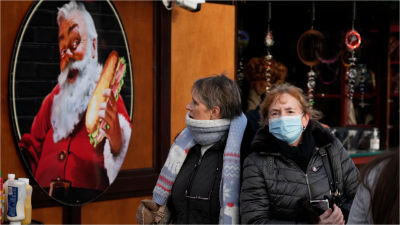Covid Omicron: New rules 'buy us more time' against variant, says Boris Johnson

What rule changes are coming in and why? ITV News Health Editor Emily Morgan explains
New measures kicking in across England on Tuesday will “buy us time” as scientists get to the bottom of the Covid-19 Omicron variant’s threat level, the prime minister has insisted.
From 4am on Tuesday face coverings are compulsory in shops and on public transport in England, while all international arrivals must take a PCR test by the end of the second day and self-isolate until they receive a negative result.
All contacts of suspected Omicron cases must also self-isolate, regardless of their age or vaccination status.
Boris Johnson said the steps will “help slow down” the variant’s spread, with two more cases confirmed on Monday, bringing the total to 11.
What do we know about the variant and how worried should we be?
“The measures taking effect are proportionate and responsible, and will buy us time in the face of this new variant,” Mr Johnson said.
“Based on everything we know, our vaccines and boosters remain our best line of defence, so it is more important than ever that people come forward when eligible to get boosted.
“Not only will today’s steps help us slow down the variant’s spread, but they will help us protect each other and the gains we have all worked so hard for.”
It comes after confirmation all people aged 18 and over will be offered a booster vaccine as part of efforts to tackle the variant’s spread.
Millions more people in the UK will become eligible for a third booster dose after early evidence suggested that higher antibody levels may protect better against the variant.
The Joint Committee on Vaccination and Immunisation (JCVI) is now advising that all adults aged 18 to 39 should be offered a booster dose, in order of descending age groups.
Those aged 40 and over are already eligible for a booster vaccine.
Changes to the vaccine programme:
Adults aged between 18 and 39 will be eligible for a booster jab
Youngsters aged between 12 and 15 will be allowed a second dose
Severely immunosuppressed individuals can have their fourth dose
Coronavirus: What you need to know
Booster doses should be given no sooner than three months after people have had their second dose of an original vaccine – shaving three months off the current wait, according to the JCVI.
In further advice, young people aged 12 to 15 should be offered a second dose of the Pfizer/BioNTech Covid-19 vaccine, no sooner than 12 weeks after their first dose.
What do the scientists fear about this strain? ITV News Political Editor Robert Peston explains
England’s deputy chief medical officer Professor Jonathan Van-Tam told a Downing Street briefing that coronavirus variants were inevitable and Omicron was the “new kid on the block for now.”
He suggested the UK was in “uncharted territory” as to whether it would take hold.
He added: “I think it’s true to say that scientists around the world, not just in the UK, unfortunately agree that this one is of increased concern.”
He said the “number of mutations present, already on first principle, makes us worry about a possible effect on vaccine effectiveness.”
Are businesses already feeling the impact of concerns about this variant? ITV News Economics Editor Joel Hills explains
Urging people not to panic, Prof Van-Tam said there were still uncertainties about how transmissible the variant is and its impact on severity of disease.
“On the effects of the new variants, and how well vaccine effectiveness will hold up, here I want to be clear that this is not all doom and gloom at this stage,” he said.
“I do not want people to panic at this stage.
“If vaccine effectiveness is reduced, as seems pretty likely to some extent, the biggest effects are likely to be in preventing infections and, hopefully, there will be smaller effects on preventing severe disease.”
Prof Van-Tam said the booster campaign has “never been more vital than at this point in time.”